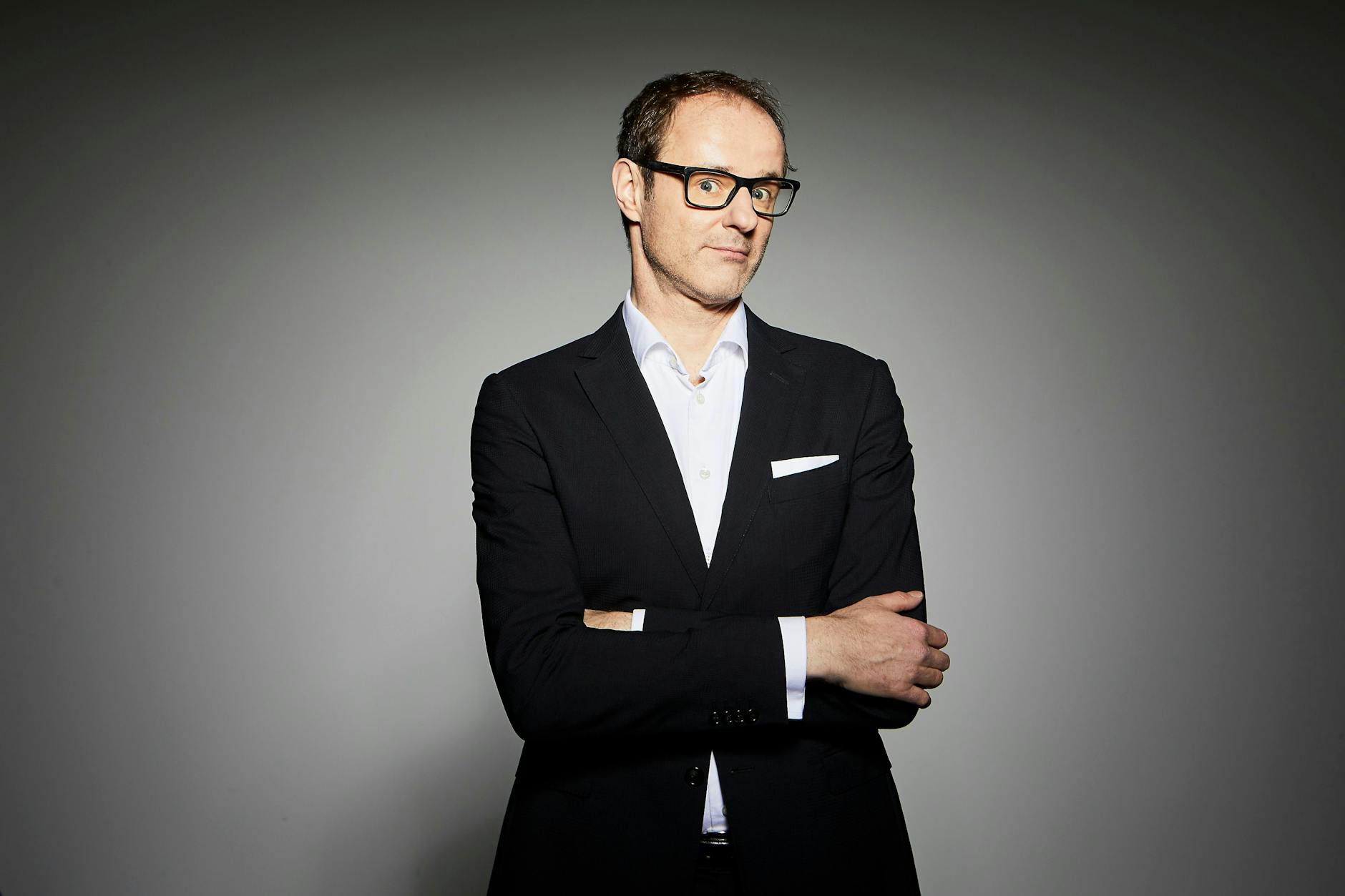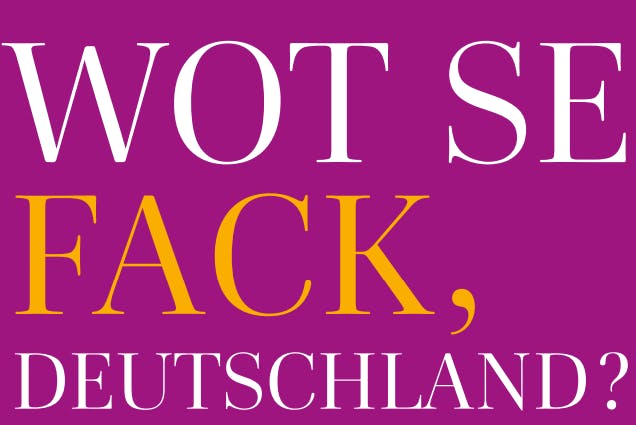Vince Ebert on the state of our society: “The fools have taken over the ship”

Speech is silver, silence is gold – and humor? As we all know, humor knows no bounds. Between political correctness, outrage culture, and the pressure to maintain a moral stance, the space for irony and ambiguity is becoming increasingly narrow. Where laughter once flourished, today we find interpretation, warning, and moralizing. Satire, it seems, must have its limits. And anyone who laughs in spite of this is considered a "bad person," says Vince Ebert.
The cabaret artist, a trained physicist, and longtime ARD knowledge communicator on the show "Wissen vor acht" (Knowledge Before Eight) is no fan of bans on thought, prescribed attitudes, or ideologically charged debates. In his new book, "What Se Fack, Germany?", he counters these ideas with deliberate irritation, a taste for contradiction, and a belief in the power of enlightenment. A conversation about jokes, worldviews, and inner struggles.
Mr. Ebert, what joke do you think of when someone says, “That’s funny, but you’re not allowed to say that anymore”?
This immediately reminds me of my time as a student in the early 1990s. My physics professor said in his inaugural lecture: "What do women and magnetic fields have in common? They're both distracting and don't do any work." Back then, we rolled our eyes; today, such a statement would cause a real scandal. Now I tell that joke on stage and turn to the people in the front row: "If you laughed, you're a bad person."
Then I'm obviously a bad person too.
You know, the function of satire has sometimes completely slipped. In satire, you say something you don't really mean, and people laugh because they know exactly you don't mean it. Unfortunately, we've become so politically correct that many people no longer recognize the second layer of a statement. Or perhaps they don't even want to. Everything is deliberately misinterpreted and scandalized. Humor suddenly has boundaries that didn't exist in this form before.
So, if it's up to you, humor knows no bounds?
Of course, there are topics that are highly controversial and that neither suit me nor the character I portray on stage.
For example?
Jewish jokes. I lived in New York for a year and was active in the stand-up scene there. I was often on stage with Jewish people who made jokes about themselves and their culture. If I had made the same jokes as a German comedian, it would have been completely inappropriate. The point is: the whole thing would then take on a different meaning. Fundamentally, there are no taboos for me – but the attitude and position must be clear.
A comedian should always ask themselves: Why am I telling this joke? What message am I trying to convey? Will the audience understand the second layer?
What do you mean when you talk about the second level?
I mean the deliberate irritation. The moment when you laugh, pause, and realize that humor and seriousness are so closely intertwined. If I'm honest, that's exactly what I enjoy most on stage – the deliberate irritation. Taking people out of their comfort zone, shaking up their worldview, and maybe even destroying them a little bit.
By quoting your former professor?
Not only that. There's a number I had in my program 15 years ago. Back then, I burned a 50-euro note every night – live on stage. Then I explained why I was doing it, what this act had to do with freedom, and why burning money bothered us. Even today, 15 years later, people still ask me about it. And do you know what people say?
The irritation continues to this day?
Right. People talk to me about it and say they can't get "this money-burning thing" out of their heads. And I think that's exactly the purpose of art. It's nice when the audience laughs for two hours, forgets their everyday lives, and has fun. But I get much more pleasure when people are surprised, when I lead them in a direction they didn't see coming. These moments do something to us.
In your book, you write that we are finding it increasingly difficult to deal with such situations.
Exactly. We've lost our tolerance for ambiguity. We no longer accept that people simultaneously possess positive and negative characteristics, as well as contradictions. Today, everything is immediately categorized: good or bad, ethical or unethical. Gray areas? They no longer exist. It seems impossible for someone to support a strict immigration ban while simultaneously training refugees in their own company. People can vote for the Green Party and still be in favor of nuclear energy. Paradoxical, but possible. The strength of enlightened Western culture was its ability to recognize and tolerate these contradictions. Roman Herzog once summed it up well: "Laptop and Lederhosen." Modernity and tradition.
You write that we are in danger of losing the values of the enlightened West—rationality, freedom of expression, evidence-based thinking. Has every countervailing force in politics and society already disappeared?
If we're talking about the fringes of society's Gaussian bell curve—regardless of political leanings—then I would answer your question with a yes. Left-wing extremists, right-wing extremists , and green fundamentalists differ in their choice of topics, but not in their radicalism. My book is an appeal to the middle of society—the liberal, enlightened middle class, to which the majority still feels they belong. But this middle has failed to speak up and say: No, we see things differently. This gave the fringes enough time to build networks. And then, insidiously and unnoticed, they took over the interpretive dominance. When the reasonable leave the discourse, they leave the field to the fools. That's exactly what happened.

But how can it be that a minority sets the tone, the majority protests briefly and then goes along with it?
Certain topics have been so widely covered in the media that the impression has been created that the interests of the majority are being represented. This misguided tolerance and the silence of civil society are now coming back to haunt us.
So the media are partly responsible for the shift in discourse?
Among other things. Let me give you an example: For years, I've been giving corporate presentations, including to automobile companies. And for years, they've been inviting Greenpeace or radical climate activists to tell the company leaders that the car should be abolished. Why do these managers do this? Greenpeace's existence is legitimate, but I don't invite my opponent and court them in the hope that everything will turn out well. Just as I can't sit down at a table with someone who calls for a caliphate and hope for a compromise. Damn it. We've long since become accustomed to this naive culture of dialogue that always only focuses on one side.
With no prospect of improvement?
We must learn to tolerate dissent again and courageously enter into controversy. And we must draw clear boundaries of tolerance. The fools have already taken over the ship, and that will only change if we finally open our mouths again. Think, not feel.
What do you mean?
Correct thinking is neither left nor right. It is as rational as possible. For example, I wanted to understand why we today discuss something as completely clear-cut as biological sex, and in doing so relativize, even negate, objectively measurable things. I really wanted to grasp it. In my book, I explain these irrationalities with the rise of so-called postmodernism, which has spread across Western universities over the past 60 years. The core idea of this school of thought is: There is no objective truth. Everything is a matter of perspective. In this school of thought, gender is also a social construct. The phrase "If I feel like a woman, I am one" comes directly from the toolbox of postmodernism. What once sounded absurd has long since become reality. What we feel is true. Everything is relative.
What consequences do you think arise from this politicization of science?
Universities have always been places of political activism – that's not a bad thing in itself. But it becomes problematic when, for example, climate policy movements in the natural sciences lead to objective science being instrumentalized for political purposes. That's exactly what's happening right now. Quite a few climate researchers are now acting as political activists and selling their statements as scientifically neutral. But science is fundamentally value-free. It should explain what is, not what should be. I did that for ten years on the ARD program "Wissen vor acht" (Knowledge before eight) – by separating worldviews from facts. But if you watch a science program today, it's always just before midnight; the earth has a fever. People no longer want to inform, they want to proselytize. I think that's fundamentally wrong.
This sounds as if the universities and science are already “lost”.
We need to massively depoliticize the university sector. This is difficult, but not impossible.
A term that's often used these days, and which you also mention in connection with wokeness, is the culture war. Both camps—progressives and right-wingers—see themselves as victims. Is this still a political dispute or has it long since become a ritualized cycle of mutual outrage?
Culture wars have always existed. I fundamentally see this struggle for positions as something positive. The Enlightenment was also a culture war – Kepler, who said that the earth revolves around the sun, thus questioning the dominance of the church. Today's culture war between left and right, however, is different: Both sides are trapped in their own irrationality.

If we stay on our current course, where are we headed? Toward a technocratic optimization state, the meme age, or a kind of supervised thinking?
By remaining silent for so long, we've already made a huge mistake – and I don't know if it can still be rectified. 2011 was a tipping point for me. Back then, former Chancellor Angela Merkel decided overnight to shut down all nuclear power plants. Even then, I said: This will cause us massive damage, both economically and in terms of energy policy. But the decisive point was that from that point on, she slowly but surely undermined the conservative core of the CDU. A vacuum emerged that the AfD knew how to exploit. And why did almost no one object? Because they remained silent. They let the butter be taken from their bread.
So we are heading into an age of ultimate silence?
At the end of my book, I write that there is only one way out of this madness: We must raise our voices again and reclaim the autonomy that has been taken away from us piece by piece. But sometimes I wonder if that's even possible in this political system.
Would a move into politics be an option for you?
No! I feel very comfortable in my role as court jester. In the past, the court jester was the only one allowed to tell the king the truth. This is precisely the role I take on when I'm invited by associations or companies and I package criticism with humor. I believe I can achieve more in this role than with a seat in the Bundestag.
Isn't it incredibly difficult to be humorous when you've lost faith in everything around you?
This is a major internal conflict. It's difficult not to become cynical about it. But there's no point in continuing to make noncommittally funny jokes while Germany goes down the drain.
Vince Ebert: Wot Se Fack, Deutschland? dtv Publishing, August 2025. 304 pages, 17 euros
Public signing event on August 12 at 3:30 p.m. at the Dussmann Kulturkaufhaus on Friedrichstraße
Berliner-zeitung




